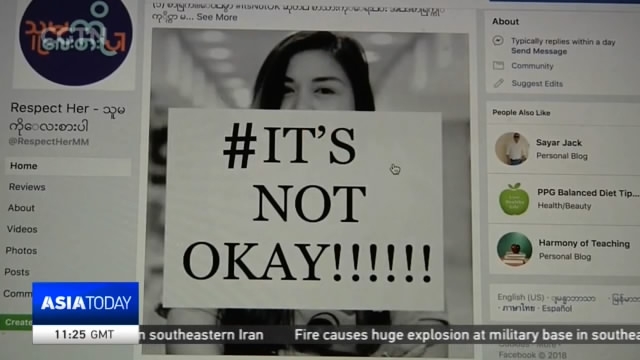
20:04, 08-Mar-2018
Yangon Women's Safety: Women learn how to break free, swat and hit at self-defense class

As the Me-Too movement spreads globally, concerns about sexual assaults against women is growing across Myanmar. The number of reported cases is increasing, leaving some women to take matters into their own hands. Dave Grunebaum has the story.
Women learn how to break free, swat and hit at this self-defense class. 29-year-old Nan Ei Khine started five weeks ago. She says she didn't even know how to throw a punch before this class.
NAN EI KHINE YANGON "Sometimes I have to work overtime and walk home late at night, and I feel afraid. I take this class so that if I'm faced with danger, I can protect myself."
The Myanmar Women's Self Defense Center says there has been an increase in the number of women who want to enroll in its course during the past two months. There's also been a boost in sales of pepper spray.
EVELYN YU YU SWE MYANMAR WOMEN'S SELF DEFENSE CENTER "There's been kind of a renewed attention on women and defense, and learning how to protect yourself ."
DAVE GRUNEBAUM YANGON "Concerns about women's safety are on the rise in Myanmar for reasons including several high profile cases of rape and murder. The number of reported cases of rape in this country went up by 28-percent from 2016 to 2017. However, experts say the increase in number of reports is probably not due to an increase in actual rapes but more likely because a higher percentage of victims are coming forward than in the past. This country has a history of victim blaming by questioning what they were wearing or what time of night they were out. It's an attitude that's starting to change."
ALEXANDRA ROBINSON UN POPULATION FUND "I think we've certainly started to see a shift towards squarely putting the responsibility for violence against women on the perpetrator. That said the relics of this narrative around victim-blaming are still very much well and alive."
The United Nations Population Fund has teamed up with local community groups to start the "Respect Her" campaign. It includes a social media drive called "it's not ok" that's picking up steam.
ALEXANDRA ROBINSON UN POPULATION FUND "Why we went with hash tag 'It's not ok' instead of me too. We didn't want women in Myanmar to feel exposed. We didn't want women to come out on Facebook and say, yes me too, I've been a survivor of gender-based violence. We really wanted to take the narrative and the responsibility for social change away from women and make it a community responsibility."
The campaign also includes pop-up theatre performances like this one to help spread their message.
KHAING MON MYAT MYANMAR ART SOCIAL PROJECT "We're using this performance to tell people that sexual harassment is not ok, domestic violence is not ok. The main message is to respect her."
It's a big push on many fronts hoping to make women safer. Dave Grunebaum, CGTN, Yangon, Myanmar.

SITEMAP
Copyright © 2018 CGTN. Beijing ICP prepared NO.16065310-3
Copyright © 2018 CGTN. Beijing ICP prepared NO.16065310-3